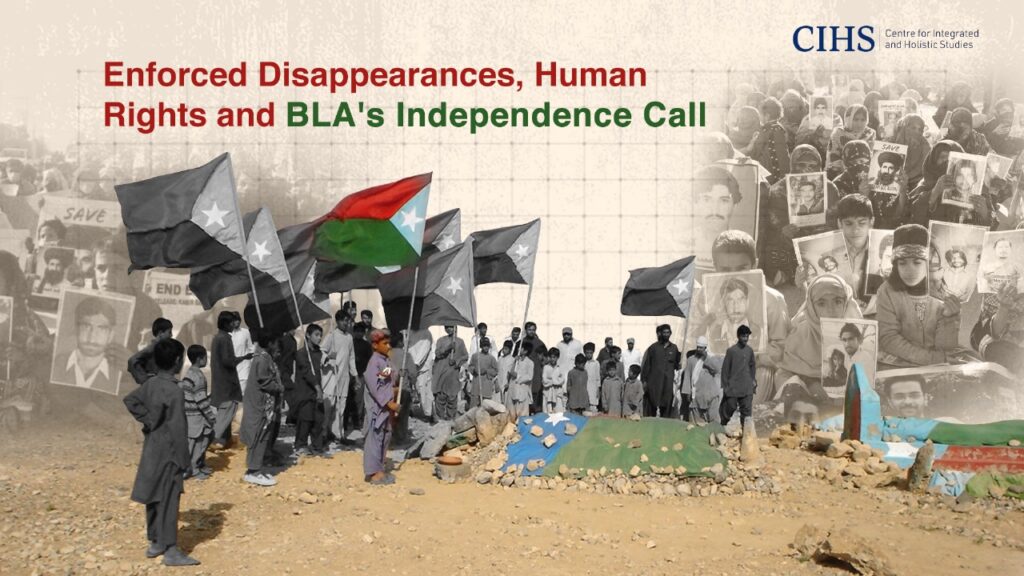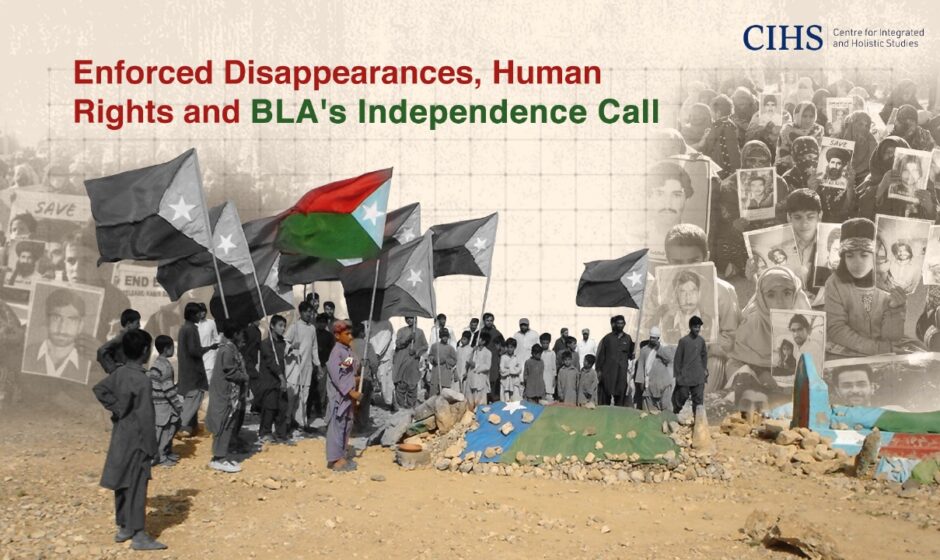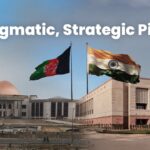By N. C. Bipindra
Balochistan has yet again entered a dangerous phase of political and humanitarian uncertainty.
Recent declaration by the Balochistan Liberation Army (BLA) to form an independent army and seek international recognition as a sovereign nation has brought decades-long freedom struggle against Pakistan’s reported occupation into sharp focus.

While BLA’s statement marks a new and more assertive phase in the struggle to take governance into their own hands, it also threatens to worsen an already grim human rights landscape.
For years, enforced disappearances, extrajudicial killings, and suppression of dissent have scarred the province. Now, with renewed calls for being recognized as a separate nation, Balochistan risks sliding deeper into vortex of violence and repression that shows little sign of abating.
Pakistan’s army and security establishment has come down heavily on Baloch people seeking their basic rights to live peacefully and honourably.
Islamabad’s new found friend in US President Donald Trump may be oblivious to this grim situation and only interested in excavating the high value rare earth metals and specialized molecules with high precision application across industries in America.
A Province in Perpetual Conflict
Balochistan, rich in natural resources but poor in development and representation has long been a theatre of conflict between Pakistani state and various Baloch nationalist groups. The grievances are old and deep, rooted in reported political marginalization, economic exploitation and cultural erasure.
BLA’s recent announcement seeking international recognition and establishment of diplomatic missions represents a bold political escalation. It reframes the struggle from one of autonomy within Pakistan to outright independence.
Predictably, such a declaration is being treated in Islamabad not as political dissent but as a direct challenge to national sovereignty, setting the stage for intensified military operations.
Beneath the political grandstanding lies a darker humanitarian crisis that predates this declaration: persistent phenomenon of unexplained disappearances and human rights abuses that have come to define life in Balochistan.
Missing People of Balochistan
For families in Balochistan, the phrase “missing persons” has become an everyday horror. Thousands of Baloch men — students, teachers, activists, and ordinary civilians — have disappeared over the years, allegedly picked up by security forces or intelligence agencies. Many are never seen again; others turn up dead, often bearing signs of torture.
According to the Human Rights Council of Balochistan (HRCB), 123 enforced disappearances and 26 killings were recorded in just August 2025. Earlier in March that year, the group documented 151 disappearances and 80 killings. Such numbers are staggering for a single province, and they are likely underestimates, given the difficulty of reporting in militarised areas.
The Pakistan Commission of Inquiry on Enforced Disappearances (COIED) has received over 10,000 cases nationwide, with a disproportionate number from Balochistan.
Yet, rights groups say that official mechanisms lack independence and transparency. Investigations rarely lead to prosecutions, and security agencies operate with near-total impunity.
The HRCB and other local NGOs have documented a recurring pattern: night-time raids, arrests without warrants, and bodies discovered days or weeks later in desolate areas.
Families often face intimidation when they speak out or join protests demanding the return of their loved ones. Many have spent years camped outside press clubs or government offices, holding faded photographs and placards that ask a simple question: “Where is my son?”
Fear and Silence: A Society Under Siege
The psychological toll on the province is immense. Entire communities live under a shadow of fear. In cities like Turbat, Kech, Awaran, and Gwadar, once bustling trade hubs, silence has replaced debate. Even student activism is seen as a potential act of rebellion.
Students have been frequent victims of disappearances, especially those affiliated with Baloch student organisations. Human rights defender Dr. Mahrang Baloch, who spearheaded a peaceful movement for missing persons, was herself detained in 2024, a move widely condemned internationally as an attempt to crush dissent.
Journalists, too, face censorship and threats. Many have been warned against reporting on disappearances or military operations. The result is a near-total blackout on independent information from much of Balochistan, leaving only official narratives and sporadic social media updates from activists who risk their lives to post them.
Extrajudicial Killings and the “Kill-and-Dump” Policy
One of the most disturbing aspects of the crisis is what local activists describe as the “kill-and-dump” policy. Individuals who disappear are later found dead, their bodies dumped on roadsides or in remote deserts. These victims are often presented by authorities as “terrorists” killed in encounters, but human rights groups say many of these encounters are staged.
The state’s security establishment insists its operations target armed insurgents, not civilians. Yet the blurred line between militant and civilian in such operations has made accountability nearly impossible. In some cases, the victims had no political affiliation at all. Families are left with bodies to bury and no answers about why their loved ones were taken or killed.
Legal and Institutional Failures
Pakistan is a signatory to major international human rights treaties, including the International Covenant on Civil and Political Rights (ICCPR) and the UN Convention Against Enforced Disappearances. Yet, in practice, these obligations remain largely unfulfilled.
The COIED, established to investigate missing persons cases, has been criticised as toothless. It lacks the authority to compel powerful agencies like the Inter-Services Intelligence (ISI) or the Frontier Corps (FC) to produce detainees or disclose information. Its reports are rarely made public, and few cases have led to convictions.
In the absence of credible accountability, enforced disappearances have become normalised as a tool of control. Human rights lawyers describe it as a deliberate policy, a way to silence opposition without legal consequence.
BLA’s Declaration and Its Fallout
The BLA’s move to declare a separate “army” and seek global recognition adds a dangerous new layer to this human rights tragedy. The Pakistani state, already hypersensitive to any challenge in Balochistan, is likely to respond with harsher counter-insurgency measures, which could lead to more disappearances, arrests, and extrajudicial killings under the banner of fighting terrorism.
Civilians will, as always, bear the brunt. In areas where the BLA has influence, locals face pressure and suspicion from both sides: insurgents demand loyalty, while security forces demand cooperation. Those who try to remain neutral risk being branded as traitors by one camp or the other.
BLA’s declaration could also complicate international responses. Pakistan will almost certainly frame the issue as an internal security matter, while Baloch groups will attempt to internationalize it through appeals to the United Nations and global human rights forums.
However, given the geopolitical stakes — including China’s multibillion-dollar China-Pakistan Economic Corridor (CPEC) projects running through Balochistan — few states are likely to openly support Baloch independence.
International Dimension
Despite mounting evidence of abuses, the international community has largely remained cautious. Western governments routinely express concern over human rights violations but stop short of tangible action, fearing diplomatic fallout with Islamabad.
China, which has strategic investments in Gwadar and across Balochistan, has little interest in amplifying human rights issues that could threaten its projects.
Human rights organisations, however, continue to push for international scrutiny. They argue that the pattern of widespread and systematic disappearances may amount to crimes against humanity under international law.
They have called for independent investigations, sanctions against individuals responsible, and greater protection for journalists and activists in the province.
Between Law and Survival
At the heart of this conflict lies a stark reality: the rule of law has eroded. Whether it is the state’s heavy-handed approach or the insurgents’ use of violence, both have undermined civilian life.
The people of Balochistan are trapped between two forces — the state’s security machinery and the insurgent networks — neither of which guarantees their safety or rights.
Without transparent investigations, due process, or justice for victims, mistrust of the state continues to deepen. Each disappearance fuels further alienation, pushing more young Baloch toward militancy. In this way, the state’s counter-insurgency strategy may be perpetuating the very insurgency it seeks to eliminate.
A Way Forward
There are no easy solutions, but certain steps are essential if Pakistan hopes to stabilise Balochistan and prevent further descent into chaos.
Pakistan must allow impartial and credible inquiries into enforced disappearances and extrajudicial killings. International observers and UN rapporteurs should be granted access to Balochistan.
Enforced disappearance should be codified as a distinct crime in Pakistan’s penal law, with mechanisms to hold perpetrators, including security personnel, accountable.
Journalists, students, and activists must be able to speak freely without fear of abduction or imprisonment. Peaceful dissent should not be equated with terrorism.
The government needs to reopen channels with Baloch leaders to address long-standing grievances about resource distribution, political representation, and autonomy.
The global community, particularly human rights bodies and democratic governments, must press Pakistan to fulfill its obligations under international law. Silence in the face of such abuses only emboldens impunity.
Human Rights at Core of Baloch Question
Balochistan’s crisis is no longer merely a political or territorial issue. It is a human rights emergency. The BLA’s declaration of independence may have reignited the debate on sovereignty, but for ordinary Baloch citizens, the more immediate concern is survival and justice.
Until the disappearances end, the dead are identified, and those responsible are held accountable, peace in Balochistan will remain elusive. The province’s future and Pakistan’s credibility as a state governed by law will depend not on military victories, but on restoring human dignity, transparency, and trust.
(Author is Chairman, Law and Society Alliance, a New Delhi-based think tank, and guest columnist with CIHS)


